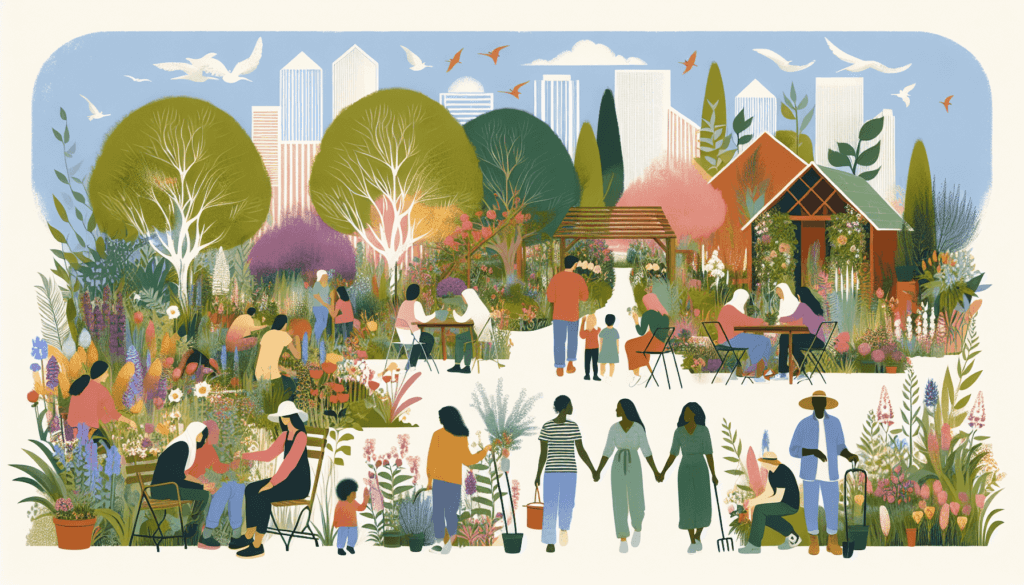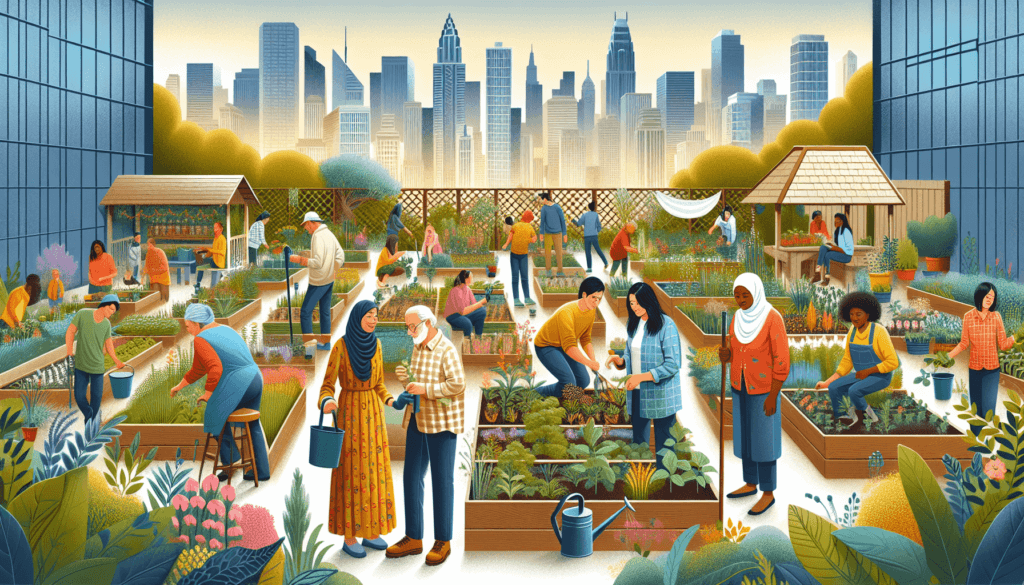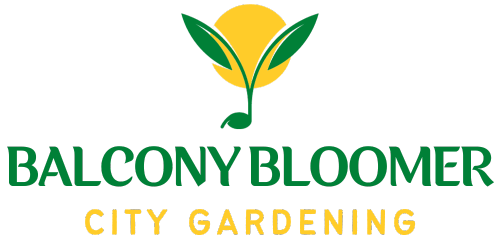Urban gardens play a vital role in fostering social connections and promoting overall well-being among urban dwellers. These green spaces not only provide a serene sanctuary amidst the hustle and bustle of city life but also serve as communal hubs where individuals can come together, engage in meaningful interactions, and cultivate a sense of belonging. By nurturing plants, sharing gardening knowledge, and participating in collaborative activities, urban gardeners create a vibrant community that enhances their emotional and mental health. In this article, we will explore the immense benefits of urban gardens in strengthening social connections and contributing to the well-being of individuals within urban environments.
Increased Sense of Community and Social Interaction
Urban gardens play a vital role in fostering a sense of community and promoting social interaction. By bringing people together for a common purpose, these gardens provide opportunities for collaboration and cooperation. Whether it’s working side by side to plant and maintain the garden or sharing tips and advice on gardening techniques, urban gardens create a space where individuals can connect with their neighbors. The shared experience of caring for a garden creates a sense of camaraderie and belonging, strengthening the bonds within the community.
Opportunities for Collaboration and Cooperation
Urban gardens provide a platform for collaboration and cooperation among community members. In these shared spaces, individuals can pool their skills, knowledge, and resources to create something greater than what each person could achieve on their own. Whether it’s organizing workshops on sustainable gardening practices or coordinating communal harvests where everyone can benefit from the garden’s produce, urban gardens encourage a spirit of collective action. Through collaboration and cooperation, communities can address common challenges and work towards building a more sustainable and resilient future together.
Enhanced Social Connections and Relationships
Participating in an urban garden fosters enhanced social connections and relationships. By engaging in gardening activities together, individuals have the opportunity to interact and get to know one another on a deeper level. Conversations that may have never taken place in a busy urban setting can flourish amidst the plants and flowers of a garden. People from diverse backgrounds and ages come together, sharing stories, experiences, and knowledge. These social interactions help break down barriers, promote understanding, and create a sense of unity and camaraderie among community members.
Promotion of Cultural Diversity
Urban gardens have the power to promote cultural diversity and celebrate the richness of different traditions and practices. When people from various cultural backgrounds come together in a garden, they bring with them unique knowledge of plants, gardening techniques, and traditional growing practices. By sharing these practices, urban gardens become vibrant spaces of cultural exchange and learning, fostering appreciation for the diversity within the community. This recognition of cultural diversity promotes inclusivity and a sense of pride in one’s heritage, creating a more harmonious and cohesive community.
Mental and Emotional Well-being
The benefits of urban gardens extend beyond the social sphere and have significant impacts on mental and emotional well-being. Spending time in nature and engaging in gardening activities have been shown to reduce stress and anxiety levels. The act of tending to plants and being surrounded by greenery has a calming effect on the mind, offering a respite from the fast-paced urban lifestyle. Additionally, being in an urban garden provides an opportunity for mindfulness and self-reflection, helping individuals cultivate a sense of peace and inner harmony.

Reduction in Stress and Anxiety
Urban gardens offer a sanctuary from the stresses of daily life, providing a peaceful and serene environment where individuals can unwind and disconnect from the demands of their busy schedules. The simple act of tending to plants and immersing oneself in nature has a proven relaxing effect on the mind and body. The rhythmic tasks of watering, weeding, and nurturing the plants can serve as a form of meditation, allowing individuals to release tension and find solace in the present moment. The tranquil atmosphere of an urban garden acts as a soothing balm, reducing stress and anxiety levels.
Improvement in Mood and Happiness
Engaging in gardening activities in urban gardens has a positive impact on mood and happiness. The act of nurturing plants and witnessing their growth and transformation can evoke a sense of joy and fulfillment. Seeing the fruits of one’s labor and experiencing the beauty of nature can have a profound effect on one’s emotional well-being. Urban gardens provide a space where individuals can reconnect with the natural world and find a sense of purpose and satisfaction. Gardening increases serotonin levels in the brain, promoting feelings of happiness, contentment, and overall well-being.
Boost in Self-esteem and Confidence
Urban gardens can be empowering spaces that boost self-esteem and confidence. As individuals cultivate and care for plants, they gain a sense of accomplishment and pride in their abilities to nurture life. Seeing the positive impact of their efforts on the garden’s health and vitality can boost self-confidence and self-worth. Additionally, urban gardens provide an opportunity for skill-building and learning, allowing individuals to develop expertise in gardening techniques. This acquisition of new knowledge and skills further enhances self-esteem and empowers individuals to take control of their own well-being.
Physical Health Benefits
Engaging in activities in urban gardens also has numerous physical health benefits for individuals. The presence of an urban garden encourages increased physical activity and exercise. Whether it’s digging, planting, weeding, or harvesting, these gardening tasks require physical exertion and promote movement. This increased physical activity helps individuals maintain an active lifestyle, contributing to their overall fitness and well-being. Additionally, urban gardens often provide access to fresh and nutritious food, allowing community members to incorporate healthy options into their diets. This focus on nutritious food supports healthy eating habits and can lead to improved overall physical health.
Increased Physical Activity and Exercise
Urban gardening provides opportunities for increased physical activity and exercise. The various tasks involved in gardening, such as digging, lifting, and bending, provide a form of low-impact exercise that can help individuals stay active. Whether it’s pushing a wheelbarrow, carrying bags of compost, or bending to pull out weeds, each action engages different muscle groups and contributes to overall fitness. Regular engagement in these physical activities can improve cardiovascular health, increase strength and stamina, and help individuals maintain a healthy weight.

Access to Fresh and Nutritious Food
Many urban gardens focus on growing food, providing community members with access to fresh and nutritious produce. In urban areas where access to affordable and healthy food options may be limited, these gardens play a crucial role in addressing food insecurity. By growing their own fruits, vegetables, and herbs, individuals can ensure a steady supply of nutritious food for themselves and their families. This access to fresh produce positively impacts their diets, promoting overall health and well-being. Furthermore, it reduces reliance on processed and unhealthy food options, contributing to a healthier and more sustainable lifestyle.
Improved Respiratory Health
Urban gardens contribute to improved respiratory health by reducing air pollution and increasing oxygen levels. Plants absorb carbon dioxide and release oxygen through photosynthesis, improving air quality in the surrounding area. This reduction in air pollution can have a significant impact on respiratory health, especially in urban environments where air pollution is a prevalent issue. Additionally, the presence of green spaces and vegetation in urban gardens helps filter out pollutants and particulate matter, creating a cleaner and healthier environment for community members.
Educational and Learning Opportunities
Urban gardens provide a valuable platform for educational and learning opportunities, particularly for children and young learners. Engaging in gardening activities stimulates curiosity and interest in scientific concepts such as plant biology, ecology, and environmental sustainability. Through hands-on learning experiences, individuals can develop a deeper understanding of the natural world and gain practical knowledge about gardening techniques. Urban gardens also promote lifelong learning, as individuals can continuously expand their gardening skills and knowledge through workshops, seminars, and interactions with fellow gardeners.
Stimulation of Curiosity and Interest
Urban gardens are dynamic spaces that stimulate curiosity and interest in individuals of all ages. The process of planting a seed, nurturing it, and witnessing its growth sparks curiosity about the natural world and the intricacies of plant life. This fascination serves as a gateway for further exploration and learning in areas such as botany, biology, and ecology. The experience of experimenting with different plants and gardening techniques also cultivates a sense of wonder and ignites a lifelong interest in the world of gardening and horticulture.
Hands-on Learning of Science and Environmental Awareness
Engaging with urban gardens offers hands-on learning opportunities that promote scientific understanding and environmental awareness. Through active participation in gardening tasks, individuals gain practical knowledge about the biology and ecology of plants. They learn about the importance of soil health, water conservation, and sustainable gardening practices. These learning experiences deepen their appreciation for the natural world and foster a sense of responsibility towards the environment. Urban gardens serve as living laboratories, where individuals can observe and understand the complex interactions between plants, animals, and their ecosystems.

Promotion of Lifelong Learning
Urban gardens promote lifelong learning by providing a space for continuous growth and development. Individuals can engage in a variety of learning opportunities, from attending gardening workshops and seminars to participating in community gardening programs. Learning about different plants, techniques, and sustainable practices keeps individuals motivated and eager to expand their knowledge. The continuous learning experiences in urban gardens not only improve individuals’ gardening skills but also nurture their curiosity and passion for environmental stewardship. The pursuit of lifelong learning enhances personal growth and contributes to the overall well-being of individuals.
Environmental Sustainability
Urban gardens play a vital role in promoting environmental sustainability in urban areas. By contributing to biodiversity and habitat creation, these gardens support the preservation of native flora and fauna. The presence of green spaces also improves air and water quality in urban environments through the absorption of pollutants and the prevention of soil erosion. Moreover, urban gardens embody the concept of efficient resource use, as they often rely on sustainable practices such as composting and rainwater harvesting. By demonstrating environmentally responsible behaviors, urban gardens inspire communities to adopt sustainable practices in their daily lives.
Contribution to Biodiversity and Habitat Creation
Urban gardens contribute to biodiversity and habitat creation by providing a refuge for local plant and animal species. These gardens can be designed to attract pollinators such as bees and butterflies, ensuring the survival and proliferation of vital populations. By including a diverse range of plant species, urban gardens create microenvironments that support a variety of insects, birds, and other small animals. Furthermore, the presence of native plants in urban gardens helps preserve local plant species and maintain a balanced ecosystem.
Improvement in Air and Water Quality
The presence of green spaces in urban areas, such as in urban gardens, helps improve air and water quality. Plants are natural air filters, absorbing pollutants and releasing oxygen. By increasing the number of plants in urban environments, gardens help mitigate air pollution and reduce the presence of harmful substances in the air. Additionally, urban gardens aid in water management by reducing the risk of soil erosion and runoff. The vegetation in these gardens helps retain rainwater and filter it before it enters water bodies, improving water quality and contributing to the overall environmental sustainability of the community.
Efficient Use of Resources
Urban gardens demonstrate the efficient use of resources by promoting sustainable practices. Composting organic waste and utilizing it as fertilizer reduces the need for synthetic fertilizers and contributes to soil health. Rainwater harvesting systems capture and store rainwater, reducing reliance on municipal water supplies and conserving water resources. By implementing these resource-conservation practices, urban gardens provide a blueprint for sustainable living in urban areas. The efficient use of resources not only benefits the environment but also reduces costs and promotes resilience in the face of resource scarcity.

Community Empowerment and Engagement
Urban gardens empower communities by fostering a sense of ownership and responsibility. When individuals actively participate in the creation and maintenance of a garden, they develop a sense of pride and investment in the space. This ownership leads to increased engagement and a willingness to take on leadership roles within the community. Urban gardens also provide opportunities for community members to participate in decision-making processes, ensuring that the garden reflects the needs and aspirations of the community. By actively engaging in the development and management of urban gardens, community members gain a sense of empowerment and agency in shaping their immediate environment.
Sense of Ownership and Responsibility
Participating in the creation and management of an urban garden instills a sense of ownership and responsibility in community members. When individuals contribute their time, effort, and resources to develop and nurture a garden, they develop a deep connection to the space. This sense of ownership motivates individuals to take care of the garden, ensuring its continued growth and sustainability. Furthermore, the responsibility of maintaining a garden cultivates a sense of accountability towards the community and the environment. The pride and commitment that come with ownership and responsibility strengthen the resilience and cohesion of the community.
Participation in Decision-making Processes
Urban gardens provide avenues for community members to participate in decision-making processes that shape the garden and the surrounding community. Through regular meetings and discussions, individuals have the opportunity to voice their opinions, ideas, and concerns. This participatory approach ensures that the garden reflects the diverse needs and interests of the community. Whether it’s deciding on plant selections, planning community events, or implementing sustainable practices, involving community members in decision-making processes strengthens their connection to the garden and fosters a sense of ownership. This engagement creates a space for dialogue, enhancing community cohesion and promoting democratic values.
Promotion of Social Advocacy
Engaging in urban gardening can promote social advocacy and inspire individuals to advocate for broader social and environmental issues. By working together in the garden, community members develop a sense of solidarity and become aware of the challenges faced by their communities. This awareness can fuel a desire for change and inspire individuals to become advocates for social and environmental justice. Urban gardens act as catalysts for collective action, providing a platform for community members to come together and advocate for issues that resonate with them. The shared experience in the garden strengthens social ties and empowers community members to make a positive impact beyond the garden’s boundaries.
Economic Benefits
Urban gardens bring about numerous economic benefits for communities. These gardens create local job opportunities, particularly in the areas of garden maintenance, event organization, and educational programs. The hiring of local individuals not only provides employment but also boosts the local economy by circulating money within the community. Additionally, the presence of urban gardens can enhance property values, as green spaces are often seen as desirable amenities. The cultivation and sale of fresh produce from urban gardens can also support local businesses, such as farmers’ markets and community-supported agriculture (CSA) programs. The economic benefits generated by urban gardens contribute to the overall well-being and resilience of the community.

Creation of Local Job Opportunities
Urban gardens create local job opportunities, particularly in the area of garden maintenance and management. Hiring individuals from the community to oversee the daily operations of the garden provides employment and income for local residents. Furthermore, the organization of educational workshops, gardening classes, and community events generates additional employment opportunities for individuals with expertise in these areas. The creation of these local job opportunities not only improves the economic well-being of community members but also enhances the sense of community pride and empowerment.
Enhancement of Property Values
The presence of urban gardens can enhance property values in surrounding areas. Green spaces, such as urban gardens, are often viewed as desirable amenities and contribute to the overall appeal of a neighborhood. Properties located near urban gardens may experience an increase in value due to the enhanced quality of life that these gardens provide. The aesthetic beauty and tranquility of an urban garden can make a neighborhood more attractive to potential homebuyers and renters, which in turn can result in higher property values. This increase in property values benefits both individual homeowners and the community as a whole.
Support for Local Businesses
Urban gardens support local businesses, particularly those involved in the sale and distribution of fresh produce. Many urban gardens have programs such as farmers’ markets or community-supported agriculture (CSA) programs, where the garden’s produce is sold directly to consumers. These initiatives provide opportunities for local businesses, including farmers, food artisans, and small-scale entrepreneurs, to showcase and sell their products. By supporting local businesses, urban gardens contribute to the economic vitality of communities, promoting entrepreneurship and fostering local economic resilience.
Food Security and Food Justice
Urban gardens play a vital role in addressing issues of food security and food justice within communities. By providing access to affordable and healthy food options, these gardens help alleviate food deserts – areas where fresh and nutritious food is scarce. Urban gardens empower community members to grow their own food, reducing their reliance on conventional food distribution systems. This self-sufficiency enhances food security by ensuring a steady supply of nutritious produce regardless of external factors. Furthermore, urban gardens empower vulnerable communities by providing them with the resources and knowledge needed to overcome food injustice and improve their overall well-being.
Access to Affordable and Healthy Food Options
Urban gardens provide communities with access to affordable and healthy food options. In areas where fresh produce is scarce or expensive, these gardens offer a sustainable solution to food insecurity. By growing their own fruits, vegetables, and herbs, community members can eliminate the financial barriers to accessing nutritious food. Urban gardens facilitate affordable food options by reducing transportation costs and eliminating the need for long supply chains. This direct access to fresh produce helps improve the overall quality of the community’s diet, promoting better health outcomes and reducing the prevalence of diet-related illnesses.
Reduction in Food Deserts
Urban gardens play a crucial role in reducing food deserts – areas where access to fresh, healthy, and affordable food is limited. Many urban areas, particularly low-income neighborhoods, lack supermarkets and grocery stores that offer a wide variety of fresh produce. By establishing urban gardens in these areas, communities can address this accessibility issue and ensure that nutritious food is readily available. The cultivation of fruits, vegetables, and herbs in these gardens helps bridge the gap between communities and fresh food sources. The reduction of food deserts promotes healthier eating habits and contributes to the overall well-being of vulnerable communities.
Empowerment of Vulnerable Communities
Urban gardens empower vulnerable communities by providing them with the resources and tools to overcome food injustice. In areas with limited access to nutritious food, community members often face numerous challenges, including higher rates of diet-related diseases. By establishing and maintaining urban gardens, these communities can take control of their food production, gaining self-sufficiency and independence. The act of growing their own food fosters a sense of empowerment, as individuals become active contributors to their well-being. Urban gardens also offer opportunities for skill-building and education, equipping community members with the knowledge and tools to create positive change in their lives and advocate for food justice.
Therapeutic and Healing Spaces
Urban gardens serve as therapeutic and healing spaces, providing individuals with opportunities for relaxation, reflection, and connection with nature. The serene and tranquil environment of these gardens offers a respite from the stresses of daily life, allowing individuals to unwind and rejuvenate their minds and bodies. Spending time in an urban garden provides an opportunity for reflection and introspection, helping individuals gain clarity and perspective. The connection with nature and natural cycles in these spaces promotes a holistic approach to well-being, addressing the physical, mental, and emotional aspects of an individual’s health.
Opportunities for Relaxation and Reflection
Urban gardens offer opportunities for relaxation and reflection in a fast-paced urban environment. By providing a peaceful sanctuary away from the noise and chaos of the city, these gardens create an oasis of tranquility. Whether it’s sitting on a bench surrounded by blooming flowers or strolling along meandering paths, individuals can find solace and a sense of calm in urban gardens. The soothing sounds, scents, and sights of nature promote deep relaxation and provide space for self-reflection. This opportunity for quiet contemplation allows individuals to recharge, reducing stress levels and promoting overall well-being.
Connection with Nature and Natural Cycles
Engaging with urban gardens connects individuals with nature and the natural cycles of life. In urban environments where access to green spaces is limited, these gardens offer a valuable opportunity to interact with the natural world. Observing the growth and transformation of plants throughout the seasons creates a sense of connection and awe for the beauty and resilience of nature. Urban gardens expose individuals to the wonders of biodiversity, as they witness the interactions between different plant species and the insects and animals they attract. This connection with nature nurtures a deep appreciation for the environment and fosters a desire to protect and preserve it.
Holistic Well-being Approach
Urban gardens promote a holistic well-being approach by addressing the physical, mental, and emotional aspects of an individual’s health. The physical activity involved in gardening supports physical fitness and contributes to overall well-being. Exposure to nature and the outdoors enhances mental well-being, reducing stress and promoting relaxation. The act of caring for plants and witnessing their growth improves emotional well-being, fostering a sense of purpose and accomplishment. Urban gardens provide a space where individuals can cultivate a balance of physical, mental, and emotional health, leading to a holistic approach to well-being.
Promotion of Sustainable and Resilient Urban Planning
Urban gardens play a significant role in promoting sustainable and resilient urban planning. By integrating green spaces into urban areas, communities are investing in the long-term health and well-being of their residents. The presence of these gardens contributes to the overall aesthetics of the cityscape, enhancing the quality of life and creating a sense of place and identity. Furthermore, urban gardens contribute to climate change adaptation efforts by providing a cooling effect through evapotranspiration and mitigating the urban heat island effect. The creation of resilient communities that can withstand and adapt to changing environmental conditions is essential for the long-term sustainability of urban areas.
Integration of Green Spaces in Urban Areas
Urban gardens promote the integration of green spaces in urban areas, enhancing the livability and quality of life for residents. In densely populated cities, green spaces can be scarce. However, by creating urban gardens, communities introduce pockets of natural beauty into these urban landscapes. These green spaces offer opportunities for recreation, relaxation, and connection with nature. The integration of green spaces improves air quality, reduces noise pollution, and provides relief from the concrete jungle. Urban gardens create a harmonious balance between infrastructure and nature, enhancing the overall well-being of urban communities.
Adaptation to Climate Change and Extreme Weather Events
Urban gardens contribute to climate change adaptation and help communities prepare for extreme weather events. By incorporating green infrastructure, such as urban gardens, into urban planning, communities can mitigate the impacts of climate change. Plants in these gardens help regulate temperature, reducing the heat island effect and providing cooling during hot summer months. Furthermore, urban gardens help absorb and manage rainfall, reducing the risk of flooding and protecting the surrounding area from water damage. The ability of urban gardens to adapt to changing weather patterns and create resilient communities is essential for the sustainable development of urban areas.
Creation of Resilient Communities
Urban gardens contribute to the creation of resilient communities that can withstand and adapt to environmental challenges. By fostering a connection with nature and promoting sustainable practices, these gardens empower individuals and communities to take an active role in creating a more sustainable future. The knowledge and skills gained through engagement in urban gardens help individuals become more resilient in the face of changing environmental conditions. By working together to create and maintain these gardens, communities build social cohesion and develop the capacity to overcome challenges collectively. The creation of resilient communities is crucial for the long-term sustainability and well-being of urban areas.


